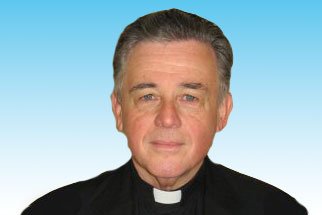
Fr. Scott Lewis, S.J
He is a past president of the Canadian Catholic Biblical Association.
God's Word on Sunday: Live a worthy life as we await the Lord
Third Sunday of Advent (Year A) Dec. 11 (Isaiah 35:1-6a, 10; Psalm 146; James 5:7-10; Matthew 11:2-11)
Should we blame God for the dark and frightening state of the world? People tend to do that in one way or another. Either they blame God for “allowing” negative things to happen and then reject God, or they accuse God outright of being the perpetrator.
God's Word on Sunday: We must lay the foundation for the Saviour
Second Sunday of Advent (Year A) Dec. 4 (Isaiah 11:1-10; Psalm 72; Romans 15:4-9; Matthew 3:1-12)
The prophecy from Isaiah does not describe anyone we have ever met, or the sort of person seen in the media. Although a descendant of King David, the figure seems to be from another world far above our own. He represents humanity’s hope and dream for millennia — someone who will put the world right. The saviour figure is one who is wise, just, righteous in judgment, incorruptible and filled with understanding and knowledge of God.
God's Word on Sunday: Jesus’ ‘armour of light’ will slay the darkness
First Sunday of Advent (Year A) Nov. 27 (Isaiah 2:1-5; Psalm 122; Romans 13:11-14; Matthew 24:37-44)
Some visions are glimpses into the future, while others reflect deep longing and hope. We begin our journey through Advent with both a sense of hope and a bit of anxiety about our world.
God's Word on Sunday: There are no shortcuts — God is the only path
Christ the King (Year C) Nov. 20 (2 Samuel 5:1-3; Psalm 122; Colossians 1:12-20; Luke 23: 35-43)
When and where was David anointed king of Israel? Take your pick — Scripture reports three events, in 1 Samuel 16:13, 2 Samuel 2:4 and 5:3. We could go through all sorts of tortured explanations in an attempt to harmonize the text, or we could accept the more likely reason: they represent three separate traditions regarding his rise to power. Regardless of the explanation, the mere fact of having a king represented a step backward for Israel.
God's Word on Sunday: So much more awaits us in God’s Kingdom
32nd Sunday in Ordinary Time (Year C) Nov. 6 (2 Maccabees 7:1-2, 9-14; Psalm 17; 2 Thessalonians 2:16-3:5; Luke 20:27-38)
Would we be willing to suffer torture and death for our faith and our inner convictions? We could be like Peter in the gospels and insist that we would stand fast even if everyone else chickened out. It is easy to boast of our courage and fortitude as long as the suffering is merely theoretical. But if we were to be hauled before authorities and forced to decide on the spot, it would not be so easy — in fact, the mere thought can be frightening.
God's Word on Sunday: The true Lord seeks those who are lost
31st Sunday in Ordinary Time (Year C) Oct. 30 (Wisdom 11:22-12:2; Psalm 145; 2 Thessalonians 1:11-2:2; Luke 19:1-10)
Many images of God compete in our individual and collective consciousness. Some of them are inspiring and lifegiving, while others smother the human soul. In its journey through millennia of history, the human understanding of God changed often as it was affected by experience and culture. The image of God is not static and unchanging, for the process continues.
God's Word on Sunday: Those ‘tuned in’ to God resonate in His heart
30th Sunday in Ordinary Time (Year C) Oct. 23 (Sirach 35:15-17, 20-22; Psalm 34; 2 Timothy 4:6-8, 16-18; Luke 18:9-14)
What does it take to get a hearing before the throne of God? How should we pray? Many prayers are directed heavenward each day — each minute and second of the day — but not all of them seem to be answered. The problem is that we fashion the prayer out of what is in our own heart. If our prayer is filled with egotism, selfishness, cynicism and smugness, the prayer is really directed towards ourselves.
God's Word on Sunday: Strength is drawn from those who inspire
29th Sunday in Ordinary Time (Year C) Oct. 16 (Exodus 17:8-13; Psalm 121; 2 Timothy 3:14-4:2; Luke 18:1-8)
In armies of the ancient world, the charisma and presence of the military leader made the difference between victory and defeat. As long as the leader stood tall and continued to fight, the warriors could take courage and continue the struggle.
God's Word on Sunday: God’s mercy is free for the asking
28th Sunday in Ordinary Time (Year C) Oct. 9 (2 Kings 5:14-17; Psalm 98; 2 Timothy 2:8-13; Luke 17:11-19)
The prophet Elisha did not do a background check on Naaman the Syrian and neither did God. Naaman was a foreigner and an enemy, for he was the commander of the Syrian army. Neither God nor the prophet seemed to care. He suffered from leprosy, and an Israelite slave girl in his household urged him to go to Elisha. He was incensed when Elisha ordered him to bathe seven times in the Jordan. Naaman angrily declared that there were many rivers in his homeland — he needn’t have made the long journey. But urged by his servant, he did as the prophet ordered and was healed. He ecstatically offered a gift to the prophet, but it was promptly refused.
27th Sunday in Ordinary Time (Year C) Oct. 2 (Habakkuk 1:2-3; 2:2-4; Psalm 95; 2 Timothy 1:6-8, 13-14; Luke 17:5-10)
“O Lord, how long shall I cry for help, and you will not listen?” In one form or another, this has been the lament of countless generations of believers. Even today, it is a telling accusatory question that is often leveled at God. Where was God during the war, the Holocaust, the earthquake, the plane crash and so on? There are no glib and easy answers, and those who attempt to explain the unexplainable merely deepen the gloom.

